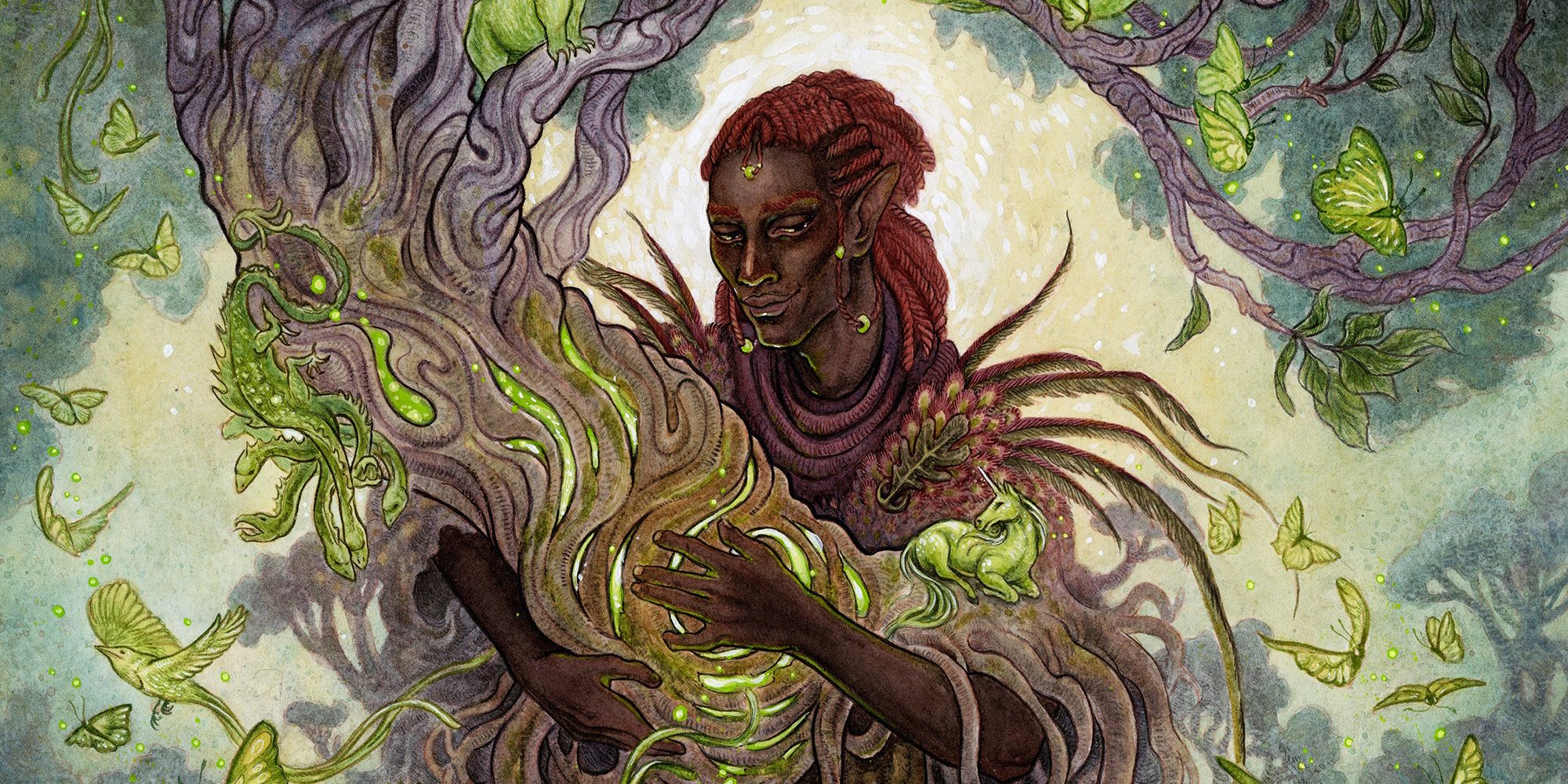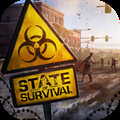
Druids are by far one of the most versatile classes to play in Dungeons & Dragons. Aside from their trademark Wild Shape ability, their spell list is also one of the most varied in the game. Like clerics, druids are a support class focused mainly on buffs and debuffs, with several healing spells.
RelatedDungeons & Dragons: All Official Bard Subclasses, Ranked
A ranking of all the official Bard subclasses from worst to best.
PostsPlaying a druid doesn't require as much bookkeeping as, say, a wizard, but there are still a lot of spells to keep track of. We assembled any spell that recovers hit points or removes a status effect into this handy list for you, so keep this in your back pocket when you need to prepare spells.
9 Cure Wounds
First Level Evocation
Lords of Waterdeep by Tony Foti- Source: Player's Handbook
- Casting Time: One action
- Heals For: 1d8 hit points plus spellcasting modifier
Cure Wounds is the standard for all healing spells. Touch an ally (or yourself) and you get 1d8 hit points plus your spellcasting modifier recovered, although this number can easily go up if you upcast it. Both druids and clerics get this spell, making it a standard part of the support class arsenal.
This isn't a particularly exciting healing spell, but it does work for most situations where you or your allies just need a quick infusion of hit points. That being said, be sure you're not overloading on healing spells when preparing spells for the day. One should do just fine for lower levels, with two or three being all you really need at higher levels.
8 Goodberry
First Level Transmutation
Dungeons & Dragons Tomb of Annihilation Illustration By Jedd Chevrier- Source: Player's Handbook
- Casting Time: One action
- Heals For: 1 hit point
Goodberry is technically a healing spell, and technically correct is the best kind of correct. Sure, it heals for just a measly one hit point, but that hit point means all the world to some people. It's a bit useless if you're using it to get up from being downed, however, as unconscious characters can't eat the berry.
We'll be honest: if you are preparing spells and need a good healing spell, prepare Cure Wounds or Healing Word instead of this one. That being said, Goodberry is useful for survival situations where food and water are scarce. You can get some nasty debuffs if you go without food or water for too long, so keep this in your back pocket if you're going on a long hike.
7 Healing Word
First Level Evocation
via Wizards of the Coast- Source: Player's Handbook
- Casting Time: Bonus action
- Heals For: 1d4 hit points plus spellcasting modifier
At lower levels, Healing Word can actually be more useful than Cure Wounds. You can cast it as a bonus action, leaving your action free to cast a cantrip, use an item, or just knock someone dead with your staff. It also works at range, making it more useful than Cure Wounds' touch-based healing.
Related14 Best Dungeons & Dragons Podcasts
These are the best D&D podcasts to listen to right now.
Posts 3About the only problem with Healing Word is that it heals for less than Cure Wounds does, but that's the price you pay for more utility. While you will get access to better healing spells as you reach higher levels, Healing Word is one of the most indispensable spells you'll have during the early stages of being a druid.
6 Lesser Restoration
Second Level Abjuration
Moon-Blessed Cleric by Marta Nael- Source: Player's Handbook
- Casting Time: One action
- Heals For: Removes status effect
Lesser Restoration is a spell you'll use for much of your campaign once you unlock it. The spell removes one status effect from yourself or your allies, such as blindness, poison, and so on. It can't heal more complex issues such as curses or petrification, but it's vital at low levels.
One much-overlooked aspect of Lesser Restoration is its ability to heal any non-magical disease you want it to. This is meant to counter afflictions such as sewer rot, but if you have a forgiving DM, you can use it to heal a variety of maladies affecting various NPCs.
5 Healing Spirit
Second Level Conjuration
- Source: Xanathar's Guide to Everything
- Casting Time: Bonus action
- Heals For: 1d6 hit points plus spellcasting modifier
Healing Spirit is an interesting spell. It conjures up a summoned spirit that can move as part of your bonus action. Additionally, you can use it to heal both yourself or any allies nearby. Functionally, this spell is similar to Spiritual Weapon, except instead of hurting people, you're healing them.
This is useful if you need something to follow your tanks around and supply a small, but reliable source of extra HP. You can flavor the spell in any way you like, so feel free to make your healing spirits look as weird and wonderful as your druid character. We recommend various animals native to the terrain your druid calls home.
4 Greater Restoration
Fifth Level Abjuration
Artwork via Wizards of the Coast- Source: Player's Handbook
- Casting Time: One action
- Heals For: Removes status effect
If a status effect can't be removed by Lesser Restoration, it can almost certainly be taken care of with this spell. Has a medusa turned your paladin to stone? Has an intellect devourer devoured your intellect? These afflictions and more can all be cured with the help of Greater Restoration.
RelatedDungeons & Dragons: How To Run A Sea Campaign
Set sail for an unforgettable campaign, mateys!
PostsYou might still want to keep Lesser Restoration prepared once you unlock this spell, just so you're not burning a fifth-level spell slot when you don't need to. While this is one of the most useful spells in the game, mundane status effects are still going to be more common by far.
3 Heal
Sixth Level Evocation
Druid of the Emerald Grove by Edgar Sánchez Hidalgo- Source: Player's Handbook
- Casting Time: One action
- Heals For: 70 hit points
Heal is a spell that accomplishes a lot. 70 hit points are yours, along with the removal of any blindness, deafness, or disease. It's a bit weird that the number of hit points healed is a flat amount instead of a dice pool, but we're not going to question it.
We're going to say it up front: you will probably not need Heal, at least not until you reach level 15 or over. Your sixth-level spell slots can be used for more interesting spells, while basic healing can be accomplished with either Lesser Restoration or another low-level healing spell.
2 Heroes' Feast
Sixth Level Conjuration
- Source: Player's Handbook
- Casting Time: Ten minutes
- Heals For: Removes all diseases and poison, plus a ton of added buffs
Heroes' Feast is a spell that's full of utility, but what really sets it apart from the others is its flavor. If you've got an hour and ten minutes, you and up to 11 of your closest friends can share a meal made of the most delectable foodstuffs you can imagine. The book calls it "magnificent" but fails to describe it outside this word, so come up with whatever kind of feast you want.
Once the meal (which takes an hour to eat) is over, the food disappears, and you're left with plenty of buffs. Any poison or disease you were afflicted with is also healed, while you also gain additional hit points. While you can't cast this spell during combat, you can still give your companions one hell of a time before they ride off into battle.
1 Regenerate
Seventh Level Transmutation
Mending Touch art by Karla Ortiz- Source: Player's Handbook
- Casting Time: One minute
- Heals For: 4d8 + 15 hit points, plus an arm and a leg
At seventh level, the amount of hit points Regenerate heals is useful, but hardly impressive. What makes this spell notable, however, is that it also recovers any body parts your character or their allies might have lost during the course of their campaign. It can also heal body parts you lost prior to the campaign.
Regenerate is a useful spell to have on hand if your limb or eye becomes cursed, infected, or otherwise in need of amputation. Sure, cutting off your hand to attune to the Hand of Vecna is a terrible decision, but Regenerate is there to make sure your consequences are kept to a minimum by getting your normal hand back.
NextDungeons & Dragons: 10 Best Cantrips For Artificers
If you're playing as an Artificer in your D&D campaign, you'll want to use these cantrips.
Posts












